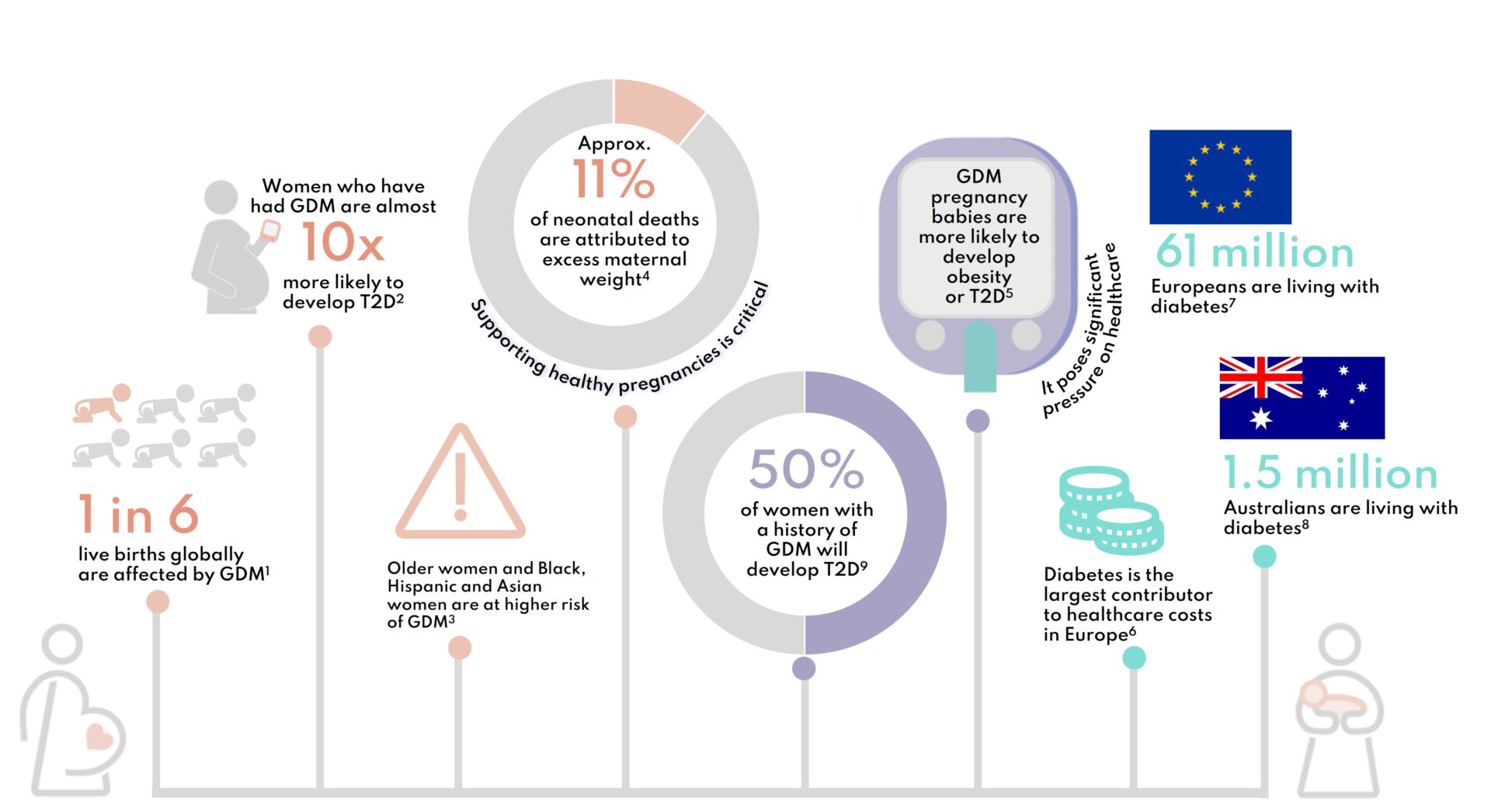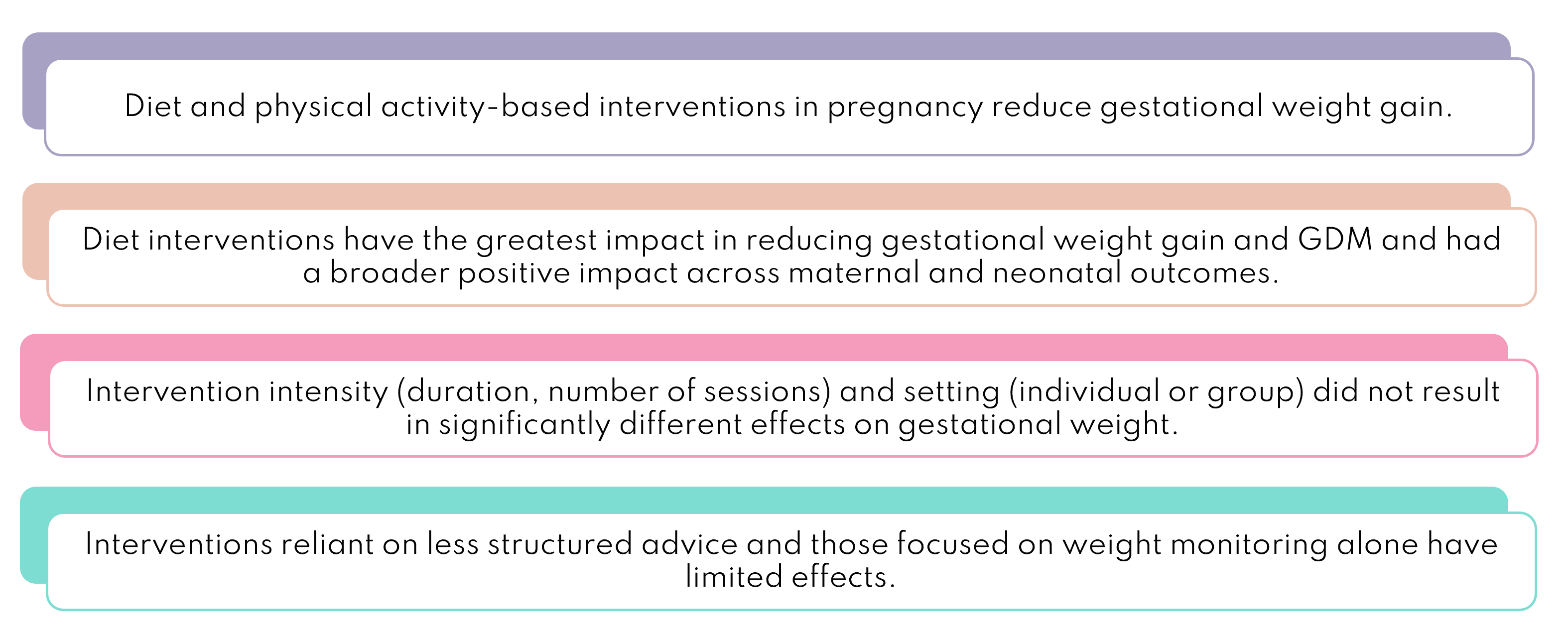Understanding the effectiveness of pregnancy and antenatal lifestyle interventions
Blog written by Professor Helena Teede, Bump2Baby and Me Principal Investigator and Clinical Lead, Monash University, Australia.
Promoting and supporting a healthy lifestyle and targeting healthy weight gain and retention is important for healthy pregnancy outcomes. Gaining weight during pregnancy is normal and expected. Staying within recommended weight gain ranges is associated with better health outcomes for both women and their children. However, exceeding the healthy weight gain recommendations during pregnancy can mean women are less likely to return to the weight they were before they were pregnant, putting them at higher risk for future pregnancies and for adverse health later in life.
The Lancet Commission recently recognised the ecological and social drivers and vulnerabilities that drive rising weight in pregnant women. Women of a higher or above healthy weight at the onset of pregnancy are more at risk of developing complications including gestational diabetes, a condition of pregnancy affecting around one in eight women that leads to raised blood glucose. This can cause serious complications in pregnancy or at birth and increases the risk of future diabetes for both the mother and her child.

Pregnancy is a window of opportunity to educate and support women to make sustainable health behaviour changes to optimise their health, and to support the health and development of their unborn child. In the journey to improve maternal and child health, innovative approaches are needed to communicate and support women throughout their pregnancy and in the early years of their baby’s life.
The Bump2Baby and Me mHealth Coaching Programme aims to support healthy lifestyle and weight gain and combat gestational diabetes, therefore improving overall well-being and pregnancy outcomes.
Laying the foundations for the Bump2Baby and Me intervention
Prior systematic reviews and meta-analyses show that excess gestational weight gain occurs in around half of pregnancies internationally, with associated adverse maternal and neonatal health outcomes. Lifestyle interventions can limit excess gestational weight gain, however, evidence on the efficacy of different intervention types on maternal and neonatal health benefits is limited.
We aimed to address these gaps. The team at Monash University undertook comprehensive literature reviews before the start and as part of the Impact Diabetes Bump2Baby project, identifying effective and innovative lifestyle interventions spanning the pregnancy and postpartum phases.
For the pregnancy phase, we conducted an extensive systematic review and meta-analysis of lifestyle interventions to limit excess gestational weight gain, exploring the efficacy of different intervention types and their impact on maternal and neonatal health. The team analysed the studies identified using the Template for Intervention Description and Replication (TIDieR) framework to deconstruct the effective or core components of pregnancy lifestyle interventions.
Highlights from the research
Evidence was condensed from 143 randomised controlled trials involving over 35,000 women, over 30 years and five continents. This showed:
Pregnancy
Overall pregnancy lifestyle interventions are effective in improving the health of women and the next generation.
Post-partum

The evidence gathered supported the role of lifestyle interventions, especially when supported by health professional coaching. It also highlighted that few interventions cross the pregnancy and postpartum phases. This, along with evidence about the efficacy and impact of intervention types laid the foundations for implementing the Bump2Baby and Me mHealth Coaching Programme, a behaviour change intervention.
Bump2Baby and Me Trial
The trial ran in maternity hospitals in Ireland, the UK, Spain and Australia (Dublin, Bristol, Granada and Melbourne) and focused on women who were identified as at high risk of gestational diabetes and who would therefore benefit most from the Bump2Baby and Me Health Coaching Programme.
Pregnant women identified at high risk of developing gestational diabetes were invited to participate in the trial. Interested women were then randomly assigned to either usual care or usual care plus the Bump2Baby and Me mHealth coaching programme.
The trial began in early 2021 and we finished recruiting women in April 2022, exceeding our target of 800 participants. The trial ran until all babies born were one year old and completed in September 2023.
Next steps
The results of the trial are currently being analysed. Project partners will disseminate findings widely through a series of workshops across Ireland, UK, Spain and Australia. These workshops will showcase the project’s overall research outcomes and foster collaboration and potential uptake among scientific, policymaking, and healthcare communities.
For all the latest project findings and workshop dates please follow us on X and LinkedIn.
Further reading
Publications relating to this work are listed below:
Cheryce Harrison, Helena Teede et al. Key Components of Antenatal Lifestyle Interventions to Optimize Gestational Weight Gain: Secondary Analysis of a Systematic Review. JAMA Network Open. 2023;6(6):e2318031.
Cheryce Harrison, Sharleen O’Reilly, Helena Teede et al. Implementation of Antenatal Lifestyle Interventions Into Routine Care: Secondary Analysis of a Systematic Review. JAMA Network Open. 2022;5(10):e2234870.
Helena Teede, Jacqueline Boyle, Cheryce Harrison et al. Association of Antenatal Diet and Physical Activity–Based Interventions with Gestational Weight Gain and Pregnancy Outcomes: A Systematic Review and Meta-analysis. JAMA Intern Med. 2022;182(2):106-114.
Briony Hill, Helen Skouteris, Helena Teede et al. Health in Preconception, Pregnancy and Postpartum Global Alliance: International Network Preconception Research Priorities for the Prevention of Maternal Obesity and Related Pregnancy and Long-Term Complications. Journal of Clinical Medicine. 2019, 8(12), 2119.
Siew Lim, Helena Teede, Sharleen O’Reilly et al. An evaluation of the impact of lifestyle interventions on body weight in postpartum women: A systematic review and meta-analysis. Obesity Reviews. 2020; 21:e12990.
Siew Lim, Sharleen O’Reilly et al. What Are the Most Effective Behavioural Strategies in Changing Postpartum Women’s Physical Activity and Healthy Eating Behaviours? A Systematic Review and Meta-Analysis. Journal of Clinical Medicine. 2020, 9(1), 237.
Siew Lim, Helena Teede, Sharleen O’Reilly et al. A systematic review and meta-analysis of intervention characteristics in postpartum weight management using the TIDieR framework: A summary of evidence to inform implementation. Obesity Reviews. 2019; 20: 1045–1056.
Siew Lim et al. Health Professionals and Postpartum Women’s Perspectives on Digital Health Interventions for Lifestyle Management in the Postpartum Period: A Systematic Review of Qualitative Studies. Frontiers in Endocrinology. 2019, 10:767.
Maureen Makama, Siew Lim et al. Barriers and facilitators to a healthy lifestyle in postpartum women: A systematic review of qualitative and quantitative studies in postpartum women and healthcare providers. Obesity Reviews. 2021; 22:e13167.
Image References
- International Diabetes Federation, https://www.idf.org/our-activities/care-prevention/gdm.html
- Vounzoulaki Elpida et al. Progression to type 2 diabetes in women with a known history of gestational diabetes: systematic review and meta-analysis. BMJ 2020, 369:m16361. https://www.bmj.com/content/369/bmj.m1361
- Diabetes Australia, https://www.diabetesaustralia.com/about-diabetes/gestational-diabetes/
- Aune D et al. Maternal Body Mass Index and the Risk of Fetal Death, Stillbirth and Infant Death: A Systematic Review and Meta-analysis. JAMA, 2014, 311:1536-46. https://jamanetwork.com/journals/jama/fullarticle/1860462
- Tommy’s, https://www.tommys.org/pregnancy-information/pregnancy-complications/gestational-diabetes/long-term-implications-gestational-diabetes
- BBC News, https://www.bbc.co.uk/news/health-49758070
- IDF Diabetes Atlas 10thEdition, https://diabetesatlas.org/
- Diabetes Australia, https://www.diabetesaustralia.com.au/about-diabetes/
- Centers for Disease Control and Prevention https://www.cdc.gov/diabetes/basics/gestational.html
